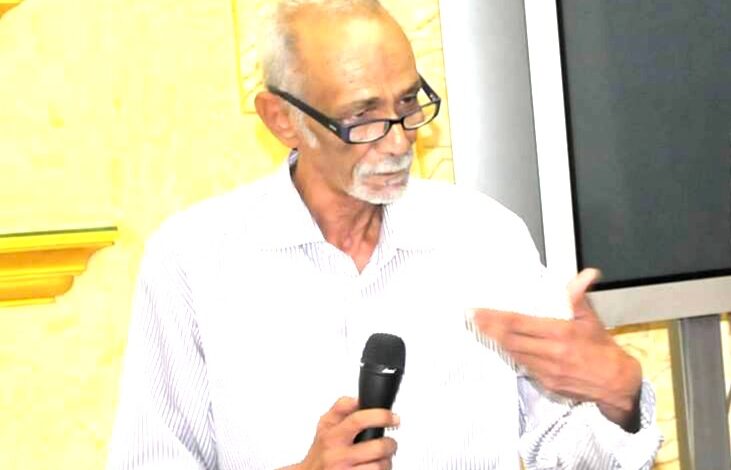
The Unfortunate Eclipse of Yet Another Encyclopedic Pyramid

Muawad Mustafa Rashid
I never met Dr. Yahya El-Hassan, but I can tell how wonderful he must have been just by knowing his son Dr.Shakir who is a close friend and a colleague in Sudan Vision daily newspaper years ago. We reflect the best parts of our parents’ thanks to the loving way they raised us. I hereby and on behalf of the Brown Land newspaper editorial board extend my deepest condolences to Dr. Shakir on the loss of his father.
We are republishing hereunder an impressive article written in Sudanow by veteran journalist and international correspondent Mr. Mohamed Osman Adam (Bello)under the above title, as it shows to our readers how great was Dr. Yahya. May Allah the Almighty rest the soul of Dr. Yahya in eternal peace.
Dr. Yahya El-Hassan Babikir passed away on Saturday night, peacefully. Peaceful but radiating, was his presence in SUNA (1980-2005) and the English-speaking media in Sudan.
His life was like a magnetic field to his colleagues and his disciples and many they are. His mere presence, and his penchant to help, were quite stunning in a profession where holding back information and knowledge is a key element for excelling over others. He helped without asking, he assisted others without demanding and he radiated without shimmering pompousness.
Three years ago I was in Dakar, Senegal, for a PANA board meeting. I was stunned by questions posed to me by as many journalists working on the PANA desk: how is Elhassan, or how is Yaya? The first time I wasn’t aware of the person mentioned because of the way the name was pronounced, so I responded by saying, fine… fine, then, one editor said he is the best feature writer we had had for quite some time. And it struck me like a clap of thunder: they meant Yahya el Hassan. For several years Yahya continued to file feature stories about Sudan and about its beauties and uniqueness without cashing a penny.
PANA was, and still is, bankrupt but he continued to write from 1992 up to 2005 almost for free, almost a feature story every weekend. And he could turn any trivial event into a sympathetic piece of literary façade about Sudan and its customs and traditions and how they are linked to and impacting Africa. He was aware that for West Africans, especially Muslims, Sudan is a minaret. And for us, he was a minaret in Sudan. He wrote about pilgrims because he was aware Africans consider the Sudan part of the holy lands, isn’t it the road to Mecca. He once told me that they considered booking in Sudan air to Mecca as part of the blessing for those going to the Holy Lands, second only to walking the distance on foot.
He wrote about herbs and traditional medicine and how it is thriving in Sudan because he knew Africans cherished it. He wrote about the Sufist movements in Sudan because he was aware of the impact of Sufism in West Africa. He wrote about gum Arabic because he knew how Sudan is leading Africa in the production of Gum Arabic. He wrote about sesame, sorghum, songs, and lyrics, about politics, coloring them and putting them within their African context. He placed Sudan well within its African context. He mastered his tools and rare are those as skillful as he was in this art.
The Sudan News Agency’s Weekly Bulletin could not be mentioned at least for our generation but linked to the late Yahya El Hassan. His features were a piece of art, well-sourced, well written, and well-argued, but above all written with love and compassion.
For thirty years I had never been failed by two persons: Hassan Kifah and Yahya El Hassan these were encyclopedias walking on two feet: asked about any new term, jargon, political terminology, or new media developments and they had it clear and fresh.
Yahya was never lazy. His movements and steps were quiet and his voice calm and low. But he never stopped learning, never bragged about his skills. It was in line with this that he surprised many when he obtained his Ph.D. from the University of Khartoum, well after retirement. During all this time and I might not be revealing a secret he never wanted to complain about: he had been contributing articles and translations for the Sudanow magazine online. And I bet for months he received no pay and did not want the director-general to be aware of that. SUNA like PANA was bankrupt.
He was industrious, working translations, and giving lectures, but spending as much as you could imagine on purchasing books, references, and daily newspapers. Like clockwork, if you wanted to find him, you had to go to the newspaper kiosk in Hajj Yusuf, early in the morning. He used to come alone then in recent years I used to see him coming with toddlers. These were the love of his life. The children of his only son. Like the Egyptian eagle and the rare black Jaguar Yahya left a single child: Shakir who stood tall and straight like a tower receiving hundreds of people who came to the cemetery for the burial of late Yahya. One well-raised and well-educated child weighed dozens.
Yahiya has joined a generation of talented self-educated, genial and generous persons who are seeping out of our hands. I just wonder how Mustafa Amin and Mohamed El Fatih were able to bring together such an array of unique talents, a breed that stands apart, ladies and gentlemen, from Mohamed Ali Saeed to Ali Dahab, to Musa Bairaq to Shareef Ahmed Taha to Salah Zaroug and Babikir Tayeb, from Neimat Shami to Elham Muhmood and Balgees Hussain among others.
But, for me, Yahya El Hassan was one of the last emperors that SUNA has produced. May Allah rest his soul in eternal peace and grant him paradise.



